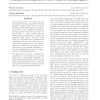Free Online Productivity Tools
i2Speak
i2Symbol
i2OCR
iTex2Img
iWeb2Print
iWeb2Shot
i2Type
iPdf2Split
iPdf2Merge
i2Bopomofo
i2Arabic
i2Style
i2Image
i2PDF
iLatex2Rtf
Sci2ools
89
Voted
ICML
2004
IEEE
2004
IEEE
Communication complexity as a lower bound for learning in games
A fast-growing body of research in the AI and machine learning communities addresses learning in games, where there are multiple learners with different interests. This research adds to more established research on learning in games conducted in economics. In part because of a clash of fields, there are widely varying requirements on learning algorithms in this domain. The goal of this paper is to demonstrate how communication complexity can be used as a lower bound on the required learning time or cost. Because this lower bound does not assume any requirements on the learning algorithm, it is universal, applying under any set of requirements on the learning algorithm. We characterize exactly the communication complexity of various solution concepts from game theory, namely Nash equilibrium, iterated dominant strategies (both strict and weak), and backwards induction. This gives the tighest lower bounds on learning in games that can be obtained with this method.
ICML 2004 | Lower Bound | Machine Learning | Machine Learning Communities | Required Learning Time |
Related Content
| Added | 17 Nov 2009 |
| Updated | 17 Nov 2009 |
| Type | Conference |
| Year | 2004 |
| Where | ICML |
| Authors | Vincent Conitzer, Tuomas Sandholm |
Comments (0)

